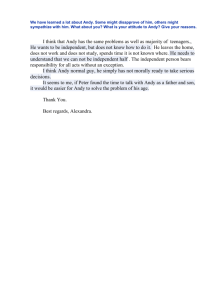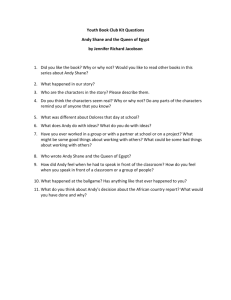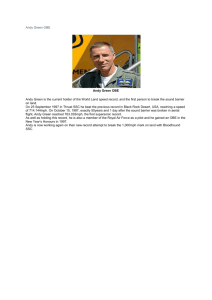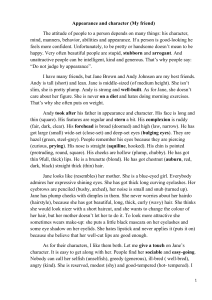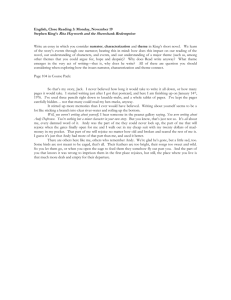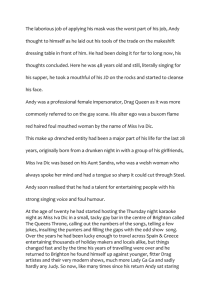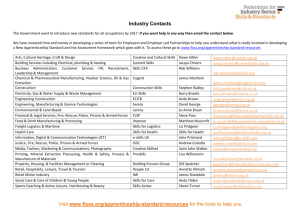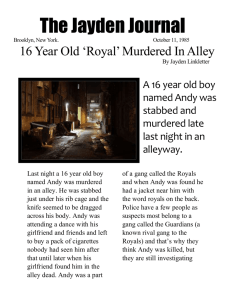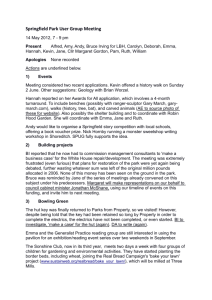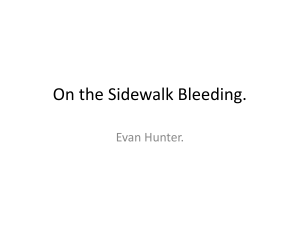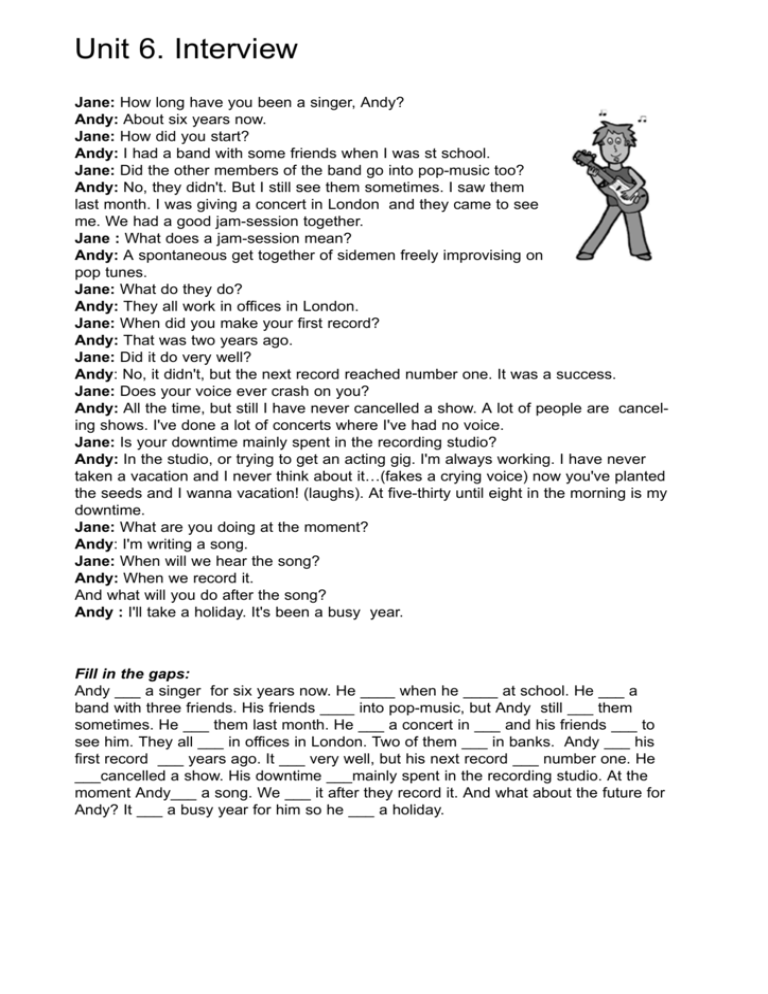
Unit 6. Interview
Jane: How long have you been a singer, Andy?
Andy: About six years now.
Jane: How did you start?
Andy: I had a band with some friends when I was st school.
Jane: Did the other members of the band go into pop-music too?
Andy: No, they didn't. But I still see them sometimes. I saw them
last month. I was giving a concert in London and they came to see
me. We had a good jam-session together.
Jane : What does a jam-session mean?
Andy: A spontaneous get together of sidemen freely improvising on
pop tunes.
Jane: What do they do?
Andy: They all work in offices in London.
Jane: When did you make your first record?
Andy: That was two years ago.
Jane: Did it do very well?
Andy: No, it didn't, but the next record reached number one. It was a success.
Jane: Does your voice ever crash on you?
Andy: All the time, but still I have never cancelled a show. A lot of people are canceling shows. I've done a lot of concerts where I've had no voice.
Jane: Is your downtime mainly spent in the recording studio?
Andy: In the studio, or trying to get an acting gig. I'm always working. I have never
taken a vacation and I never think about it…(fakes a crying voice) now you've planted
the seeds and I wanna vacation! (laughs). At five-thirty until eight in the morning is my
downtime.
Jane: What are you doing at the moment?
Andy: I'm writing a song.
Jane: When will we hear the song?
Andy: When we record it.
And what will you do after the song?
Andy : I'll take a holiday. It's been a busy year.
Fill in the gaps:
Andy ___ a singer for six years now. He ____ when he ____ at school. He ___ a
band with three friends. His friends ____ into pop-music, but Andy still ___ them
sometimes. He ___ them last month. He ___ a concert in ___ and his friends ___ to
see him. They all ___ in offices in London. Two of them ___ in banks. Andy ___ his
first record ___ years ago. It ___ very well, but his next record ___ number one. He
___cancelled a show. His downtime ___mainly spent in the recording studio. At the
moment Andy___ a song. We ___ it after they record it. And what about the future for
Andy? It ___ a busy year for him so he ___ a holiday.
Say if the statement is right or wrong:
right
wrong
Andy has no experience as a vocalist.
He has never been to England.
His voice has never crashed on him.
Andy has no sence of humour.
FUTURE PROGRESSIVE (CONTINUOUS)
Будущее продолженное время, как правило употребляется со словами
определяющими какой-то период времени, в который будет происходить
действие:
tomorrow at this time - завтра в это время, at 5 o'clock - в 5 часов, this time next
Monday - в это время в следующий понедельник и т.д.
Это время употребляется для выражения незаконченного действия, которое
будет совершаться в определённый момент в будущем.
Этот момент может быть выражен:
а) точным указанием времени, или определённый момент в
будущем с обстоятельствами типа: at …… o'clock, at this time и т.п.
Например: At this time tomorrow the boys will be playing incidental music.
б) либо с придаточным предложением, в котором другое действие,
выражено глаголом в Present Indefinite.
Например: When we arrive in London, it will be probably raining.
Don't ring her up at 12 o'clock. She will be writing her composition then.
FUTURE PROGRESSIVE также означает будущее событие, в котором говорящий
уверен, это не предварительная договорённость, а то, что говорящий знает
заранее: I'll be seeing Kate tonight. - Я встречусь с Кейт сегодня вечером
She will be jumping for joy when she has you present.. -Она будет прыгать от
радости, когда получит твой подарок Future Progressive - естественное, с точки
зрения говорящего, течение событий:
He'll be waiting for you.
Он тебя будет ждать.
Другой распространенный случай употребления FUTURE PROGRESSIVE:
когда мы говорим о действии в развитии, в определенной точке будущего или на
протяжении периода времени:
I'll be thinking of you all day. - Я буду думать о тебе весь день
Tomorrow at this time, I'll be lying on the beach in the sun instead of shivering here
with cold.
- Завтра в это время я буду лежать на пляже под солнцем вместо того, чтобы
дрожать здесь от холода.
FUTURE PERFECT образуется при помощи вспомогательных глаголов
shall, will + have + 3 форма смыслового глагола.
Будущее завершенное время, это то время, при котором действие завершится
(закончится) к определённому моменту в будущем.
Этот момент может быть выражен:
а) обозначениями времени с предлогом by, before,
when (by 5 o'clock к 5 часам, by that time к тому времени и т.п.)
Например: Your instrument will have been with me by the time you return. Don't worry.
We shall have finished all the work by 6 o'clock this afternoon.
I shall have read this book by tomorrow evening.
Thousands of people will have seen this exhibition by the end of the month.
They will have done half of the journey when they reach the Volga.
б) другим будущим действием, выраженным придаточным предложением
условия и времени с глаголом в настоящем времени, который переводится
на русский язык, глаголом в будущем времени.
Например: You will have finished your work before the bell rings.
1.Переведите с русского на английский.
Я уже запишу эту песню до того, как ты придешь.
К концу месяца я сыграю пять концертов.
Я выучу серенаду завтра к 7 часам.
2. Put the verb in brackets into FUTURE PERFECT:
The boy ... (perform) at the show.
The boy ... (traspose) the music .
The girls ... (modulate) the prelude.
Put the verb in brackets into the correct Future tense:
Mr. Brown … (to be) in the dining-room at 8 o'clock tomorrow.
I … (to see) you on Friday.
Your instrument … (to be) with me by the time you return. Don't worry.
They … (to climb) the mountains all the month.
Don't ring her up at 12 o'clock. She… (write) her composition then.
At this time tomorrow the boys of our group … (play) ambient music.
When we arrive in London, it probably …(rain).
We ... (finish) all the housework by 6 o'clock this afternoon.
I … (read) this book by tomorrow evening.
Thousands of people … (see) this exhibition by the end of the month.
They … (build) this house long before the end of October.
They … (do) half of the journey when they reach the Volga.
I … (write) my composition by the time you come back.
We've got five days in London: we are leaving on Monday; but I'm sure
that we… (see) everything of importance by then.
I hope it … (stop) snowing by tomorrow morning.
It is nearly autumn, soon the leaves … (change) colour.
Let's wait here; Tower Bridge … (open) in a minute to let that ship through.
Don't ask her anything. Next thing she … (tell) you she is right.
Music Festivals
Music Festival is a celebratory event when musicians perform
over several days at some place. Among the most famous
festivals are Edinburgh Festival, Eisteddfod, and Woodstock
Festival.
Edinburgh Festival includes several annual and biannual arts
festivals which take place in Edinburgh, Scotland, during the
months of August and September, attracting audiences from
around the world. It was founded in 1947 and is now recognized as one of the world's
most important celebrations of the arts. It presents international and Scottish performers of theater, music, dance, and opera in all of Edinburgh's major theaters and concert halls.
Eisteddfod (Welsh, "a sitting of learned men"), national music and literary festival held
each summer in Wales to promote Welsh language, literature, music, and customs.
The week-long ceremony is a revival of the ancient Welsh custom of meeting bards, or
minstrels, for competition among themselves.. The history of Eisteddfod dates to the
beginning of the Christian era.
Woodstock Festival, rock festival that took place near Woodstock, New York, on
August 15, 16, and 17, 1969, and that became a symbol of the 1960s American counterculture and a milestone in the history of rock music. It is connected with the movement of hippies and who characteristically rejected materialism and authority, protested
against the Vietnam War, supported the civil rights movement, dressed unconventionally, and experimented with sex and illicit drugs.
During the monumental three-day event some of the greatest musicians of the 1960s
performed, including Janis Joplin, Ravi Shankar, Arlo Guthrie, and Joan Baez as well
as the bands The Who; Crosby, Stills, Nash and Young; The Jefferson Airplane; The
Grateful Dead; Sly and the Family Stone; and Creedence Clearwater Revival. Singer
Joe Cocker and guitar player Carlos Santana, up to then unknown, became overnight
stars. Jimi Hendrix, the final act of the festival, played a freeform solo guitar rendition
of "The Star Spangled Banner."
What is a music festival?
How often does Edinburgh Festival take place?
When was it founded?
What does Eisteddfod mean?
What is Woodstock Festival?
What other festivals do you know?
At what festival you will see this instrument?
What musical instrument is in the picture?
1) a bagpipe
2) a bugle
3) a cornet
4) a fiddle
Practice
Find the English for: джем - сейшн, «пропал голос, студия звукозаписи,
играть(бренчать) на гитаре, исполнить перед кем-либо, праздничное событие
1. Fill in the prepositions where necessary:
1 Does your voice ever crash ...you?
2 You must take part ... this work.
3 You needn't ... go there.
4 The fingering you use for a passage can make the difference ... being able to play
something, and not being able to.
5 He is similar ... me.
6 She likes to perform ... public.
2. Match verbs with their descriptions :
a) Appear b) Compose c) Hark back d) Jam e) Perform f) Play, Thrum, Noodle (slang),
Twang, Strum
1 - if something new or surprising, it happens or exists for the first time
2 - to write a piece of music
3 - to be similar to something in the past : music that harks back to the early age of
jazz.
4 - to play music informally with others without practising first
5 - to do something to entertain people, for example by acting a play, or playing a
piece of music:
6 - to play an instrument such as a guitar by moving your fingers up and down across
its string
Fill in the neccessary verb in appropriate form:
1. Several neo-punk bands have recently ... on the music scene.
2. I've never seen `Othello' ... so brilliantly.
3. Chris will be ... in public next week.
4. Could you ... a piece for the concert?
3. Humour:
A musician arrived at the pearly gates. - (Небесные врата)
``What did you do when you were alive?'' asked St. Peter.
``I was the principal trombone player of the London Symphony
Orchestra''
``Excellent! We have a vacancy in our celestial symphony orchestra
for a trombonist. Why don't you turn up at the next rehearsal.''
So, when the time for the next rehearsal arrived our friend turned up
with his heavenly trombone.
As he took his seat God moved, in a mysterious way, to the podium and tapped his
baton to bring the players to attention. Our friend turned to the angelic second trombonist (!) and whispered, ``So, what's God like as a conductor?''
``Oh, he's O.K. most of the time, but occasionally he thinks he's von Karajan.''
4. Write part of a fan letter from a young teenager to a musician or a pop star.
1.
2.
4. Find in the picture:
a)treble registeres; keyboard; bass registeres;bellows; basses
3.
b) What instrument is in the picture?
4.
c) What is the name of Russian accordion?
5.
Make up a story on the picture. Use the words:
a wunderkind, his only toys were trumpets, drums, flutes and anything out of which he
could get musical sounds, the strongest desire of the boy's nature, to have him properly trained, to tour all over the world, to be honoured, to perform, to grow older, to
remain
Active vocabulary:
jam-session
take place
rehearsal
bards
guitarist
minstrels
awkward
overnight stars
Learn a few more idioms:
1. big deal {interj.}, {slang}, {informal} (loud stress on the word "deal") Trifles; an unimportant, unimpressive thing or matter. So you became a rock star - big deal! 2. down and out {adj. phr.} Without money; without a job or home; broke. Poor
Sam lost his job after his wife had left him; he is really down and out.
3. fall behind {v.} To go slower than others and be far behind them. When the
campers took a hike in the woods, two boys fell behind and got lost. Frank's lessons
were too hard for him, and he soon fell behind the rest of the class. Mary was not
promoted because she dreamed too much and fell behind in her lessons.
4. find fault {v. phr.} To find something wrong; complain; criticize. She tries to
please him, but he always finds fault. They found fault with every note I played.
Compare: JUMP ON, PICK AT.
5. louse up {v.}, {slang} To throw into confusion; make a mess of; spoil; ruin. When
the man who was considering John's piano heard that the basement was cracked,
that was enough to louse up the sale. Fred's failure in business not only lost him
his business but loused him up with his wife. The rain loused up the picnic. See:
MESS UP, FUCK UP.
Translate into English:
1. Записал новую песню? - Подумаешь!
2. После неудачи с гастролями у него дело труба (он сел в галошу).
3. Ты отстаёшь от своей группы, послушай!
4. Они всегда придирались ко мне.
5. Он провалил своё выступление.
Keys : 1. 1 - on; 2 - in; 3 - x; 4 - between; 5 - to; 6 - in 2. a) - 1; b) - 2; c) - 3; d) - 4
e) - 5; f) - 6; 1.- appeared 2.- performed 3.- performing 4. - compose
4. a) treble registeres - 3; keyboard - 1; bass registeres - 4; bellows - 2; basses - 5
b) accordionn c) bayan
"English In Music" by Nikolayko Anatoly, ver. 1.01.
Copyright © 2006 Nikolayko Anatoly. All rights reserved.
Last version and all information: http://www.vsemusic.ru

